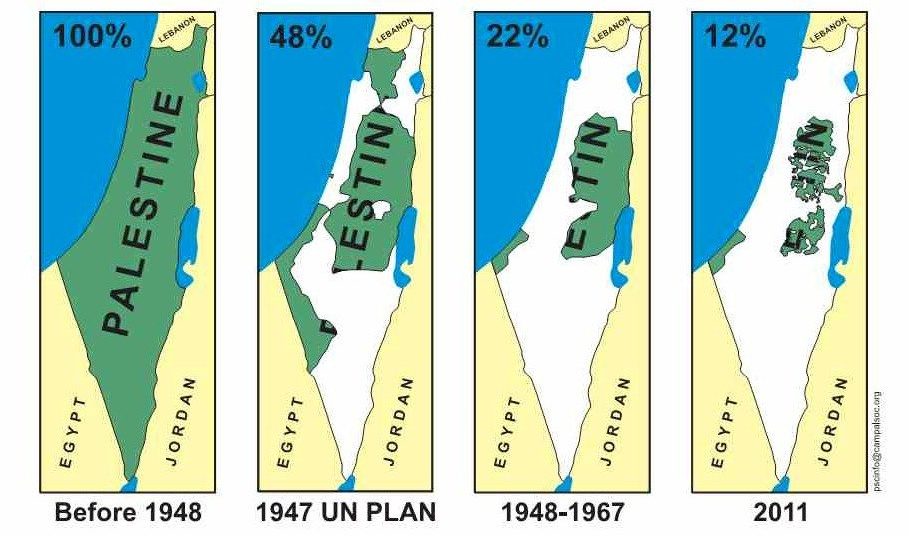This slogan frightens those in power not because it calls for violence, but because it calls for justice. It calls for the restoration of a land stolen, and the equality of a people erased
Zionists and their allies routinely attack the slogan “From the river to the sea, Palestine will be free” as a call for the destruction of Israel. But what exactly does this claim reveal—about the slogan, about Zionism, and about the underlying truth they seek to suppress?
To understand the accusation, we must first understand the slogan: What does “from the river to the sea” mean? What is Palestine? What does it mean for Palestine to be free?
What the Slogan Actually Means
The phrase “from the river to the sea” refers to a specific geographic region: the land between the Jordan River and the Mediterranean Sea. This was known, universally and officially, as Palestine prior to 1948. Every map, every British and Ottoman administrative document, and every global reference to the area used that name.

So when we speak of Palestine, we are not invoking a fantasy or a fabrication. We are referring to a real, historically recognised land, which has been subjected for over a century to colonisation, partition, ethnic cleansing, and military conquest. Out of that violence emerged the State of Israel, along with the continuing occupation of Palestinian land.
The call for Palestine to “be free” is a demand for liberation from that condition.
Why Zionists Fear It
Zionist opposition to the slogan is revealing. If the freedom of Palestine between the river and the sea necessarily implies the destruction of Israel, what does that say about Israel’s nature? It suggests, quite directly, that Israel cannot coexist with a free Palestine—because Israel, as it currently exists, is predicated on the denial of Palestinian freedom.
The history bears this out. In 1947, the United Nations proposed a partition of Palestine, giving over half of it to European Jewish settlers, despite them making up only a third of the population and owning under 7% of the land. Palestinians were not consulted. They rejected the plan, not out of irrational hostility, but out of a simple and universal moral principle: no people can accept the foreign partition and gifting of their homeland to others.
From this rejection followed war, dispossession, and the mass displacement of over 750,000 Palestinians—the Nakba, or catastrophe. Israel was founded not alongside Palestine, but atop it.
This is why Zionists interpret the call for freedom as a threat. Because to acknowledge Palestinian freedom is to acknowledge a fundamental injustice at the heart of the Israeli state’s creation.
Restoration Is Not Destruction
Even taken in its most expansive interpretation—as a call for the liberation of all of historic Palestine—the slogan does not call for genocide, expulsion, or the erasure of Jewish life. It calls for the dismantling of a system built on apartheid, supremacy, and dispossession enforced through systemic violence and widespread killing. It calls for restoration, not destruction.
What would such a restoration look like? A democratic state in which all inhabitants—Muslim, Christian, and Jew—live as equals. A society built not on ethnic privilege or military domination, but on human dignity and justice. This is not a fantasy. It is the only moral alternative to endless bloodshed.
Of course, there will be those who reject such a vision, those who believe that Jews must rule and Arabs must submit. Such individuals, regardless of their religion or ethnicity, have no place in a democratic future. But those willing to renounce domination and embrace equality will belong, whether they were born in Jaffa or Haifa, Bethlehem or Tel Aviv.
What “Freedom” Really Means
“From the river to the sea, Palestine will be free” is not a call for revenge. It is not a threat of extermination. It is a statement of hope: that one day, a people subjected to decades of displacement, military rule, siege, and apartheid will be free to return, to rebuild, and to live with dignity in their own land.
To twist this into a cry for violence is not only dishonest, it is projection. The real violence, the real destruction, is what the slogan opposes: ethnic cleansing, military occupation, and the reduction of a people to exiles in their own homeland.
To stand with this slogan is to stand for freedom, not against anyone’s existence. And those who attack it reveal far more about the injustice they defend than the justice they fear.